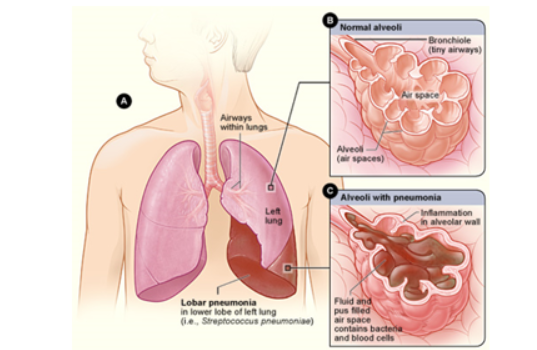Oleh: Thalia Kaylyn Averil
Pneumonia adalah infeksi yang terjadi pada paru-paru sehingga terjadi penumpukan cairan atau nanah di alveolus, yaitu kantung udara di paru-paru. Infeksi ini dapat memengaruhi salah satu atau kedua paru. Pneumonia dapat disebabkan oleh virus, bakteri, jamur, maupun parasit. Untuk pneumonia yang disebabkan oleh virus, virus yang paling sering adalah virus influenza, respiratory syncytial virus (RSV), dan severe acute respiratory syndrome coronavirus 2 (SARS-CoV-2). Pneumonia yang disebabkan oleh bakteri dapat diklasifikasikan lagi menjadi dua, yaitu bakteri tipikal dan atipikal. Bakteri tipikal dapat dibiakkan pada media standar, sedangkan bakteri atipikal tidak dapat dibiakkan pada media standar. Pneumonia tipikal ditandai dengan infeksi yang disebabkan oleh Streptococcus pneumoniae, Haemophilus influenzae, Staphylococcus aureus, atau Moraxella catarrhalis. Di sisi lain, pneumonia atipikal sebagian besar disebabkan oleh Legionella, Mycoplasma pneumoniae, Chlamydia pneumoniae, dan Chlamydia psittaci. Pneumonia dapat menyerang orang-orang dari segala usia, tetapi ada beberapa individu yang lebih rentan terkena pneumonia, yaitu:
- Lansia berusia lebih dari 65 tahun
- Anak-anak berusia kurang dari 5 tahun
- Kebiasaan merokok dapat merusak paru-paru dan menurunkan respons dari sistem kekebalan tubuh terhadap infeksi
- Individu dengan penyakit jantung kronis atau diabetes mellitus lebih rentan terkena pneumonia karena dapat melemahkan sistem kekebalan tubuh
- Struktur organ-organ pernapasan yang lemah dapat membuat paru-paru lebih rentan terkena infeksi.
Paru-paru bukanlah organ tubuh yang steril. Spesies-spesies bakteri seperti Streptococcus dan Mycoplasma yang sering dikaitkan dengan terjadinya pneumonia adalah bagian dari mikrobioma paru-paru yang normal. Sistem kekebalan tubuh di paru-paru akan menjaga mikroba tetap terkendali. Jika sistem kekebalan tubuh terganggu, virus, bakteri, jamur, atau parasit yang masuk ke dalam paru-paru dapat berkembang biak dan menggantikan mikrobioma normal sehingga mikroba yang masuk dapat tumbuh berlebihan dan menginfeksi. Ketika sistem kekebalan tubuh merespons suatu infeksi, hal tersebut dapat menyebabkan peradangan akut sehingga terdapat peningkatan sel inflamasi di kantung udara paru-paru.

Gambar 1. Perbandingan paru-paru normal dan paru-paru yang telah terinfeksi pneumonia.
Dalam klasifikasi pneumonia terbaru, pneumonia dibagi menjadi empat kategori, yaitu pneumonia yang didapat dari komunitas (CAP), pneumonia yang didapat dari rumah sakit (HAP), pneumonia terkait layanan kesehatan (HCAP), dan pneumonia terkait ventilator (VAP). Penyebab utama pneumonia yang didapat dari komunitas (CAP) adalah Streptococcus pneumoniae, diikuti oleh Klebsiella pneumoniae, Haemophilus influenzae, dan Pseudomonas aeruginosa. Berbeda dengan penyebab wabah pneumonia yang terjadi di Cina sekarang, yaitu Mycoplasma pneumoniae.
Gejala dari pneumonia bisa ringan atau berat, tergantung dari penyebabnya, umur, dan kesehatan tubuh secara keseluruhan. Gejala pneumonia juga terkadang mirip dengan gejala flu. Pneumonia dapat menyebabkan gejala-gejala yang meliputi:
- Nyeri dada saat bernapas atau batuk
- Menggigil
- Demam
- Batuk disertai/tanpa disertai lendir
- Kadar oksigen darah rendah
- Sesak napas
Selain itu, gejala-gejala lainnya yang dapat dialami oleh penderita pneumonia adalah nyeri otot, kelelahan, mual, muntah, dan diare. Lansia yang berumur lebih tua dapat mengalami kebingungan, kelelahan, dan suhu tubuh lebih rendah dari normal, tetapi bukan demam. Untuk bayi, gejala yang biasa dialami adalah muntah, tampak gelisah, atau menunjukkan tanda-tanda masalah pernapasan. Jika Anda mengalami gejala-gejala berikut, hubungi dokter untuk didiagnosis dan mendapatkan penanganan lebih lanjut!
Diagnosis pneumonia adalah dengan melakukan pemeriksaan paru-paru, seperti mendengarkan menggunakan stetoskop apakah ada suara yang tidak normal saat bernapas. Selain itu, rontgen dada juga dapat dilakukan untuk menentukan lokasi dan penyebab pneumonia. Berkaitan dengan sebelumnya, pemeriksaan darah dan dahak juga dapat dilakukan untuk menentukan penyebab dari infeksi. Pemeriksaan denyut nadi dilakukan untuk menilai banyaknya kadar oksigen yang beredar di dalam tubuh untuk menentukan keparahan pneumonia dalam memengaruhi pertukaran udara di paru-paru.
Lalu, hal-hal apakah yang dapat dilakukan untuk mencegah terkena pneumonia? Simak caranya berikut ini!
- Pneumonia paling efektif dicegah dengan vaksinasi. Jenis pneumonia tertentu dapat dicegah dengan menerima vaksin influenza dan pneumokokus.
- Sering mencuci tangan dengan sabun dan air dapat membantu menghentikan penularan mikroba penyebab pneumonia.
- Pola makan seimbang, sering berolahraga, dan berhenti merokok adalah salah satu cara untuk meningkatkan sistem kekebalan tubuh sehingga dapat mencegah pneumonia.
- Kontrol penyakit-penyakit seperti penyakit jantung kronis, diabetes mellitus, atau asma dengan baik.
- Hindari berkontak langsung dengan penderita pneumonia.
Referensi:
- Sorongan TP. Fakta baru pneumonia anak misterius yang ‘meledak’ di China [Internet]. Jakarta: CNBC Indonesia; 2023 Des 1 [cited 2023 Des 3]. Available from: htt4ps://www.cnbcindonesia.com/news/20231201180353-4-493871/fakta-baru-pneumonia-anak-misterius-yang-meledak-di-china
- Rahmadania SR. Dokter paru: penyebab wabah pneumonia di China sudah lama ada di RI [Internet]. Jakarta: detikHealth; 2023 Des 1 [cited 2023 Des 3]. Available from: https://health.detik.com/berita-detikhealth/d-7066132/dokter-paru-penyebab-wabah-pneumonia-di-china-sudah-lama-ada-di-ri
- National Heart, Lung, and Blood Institute. What is pneumonia? [Internet]. Bethesda: National Heart, Lung, and Blood Institute; date of publication unknown [updated 2022 Mar 24] [cited 2023 Des 3]. Available from: https://www.nhlbi.nih.gov/health/pneumonia
- Center for Disease Control and Prevention. Pneumonia [Internet]. Atlanta: Center for Disease Control and Prevention; date of publication unknown [reviewed 2022 Sep 30] [cited 2023 Des 3].
